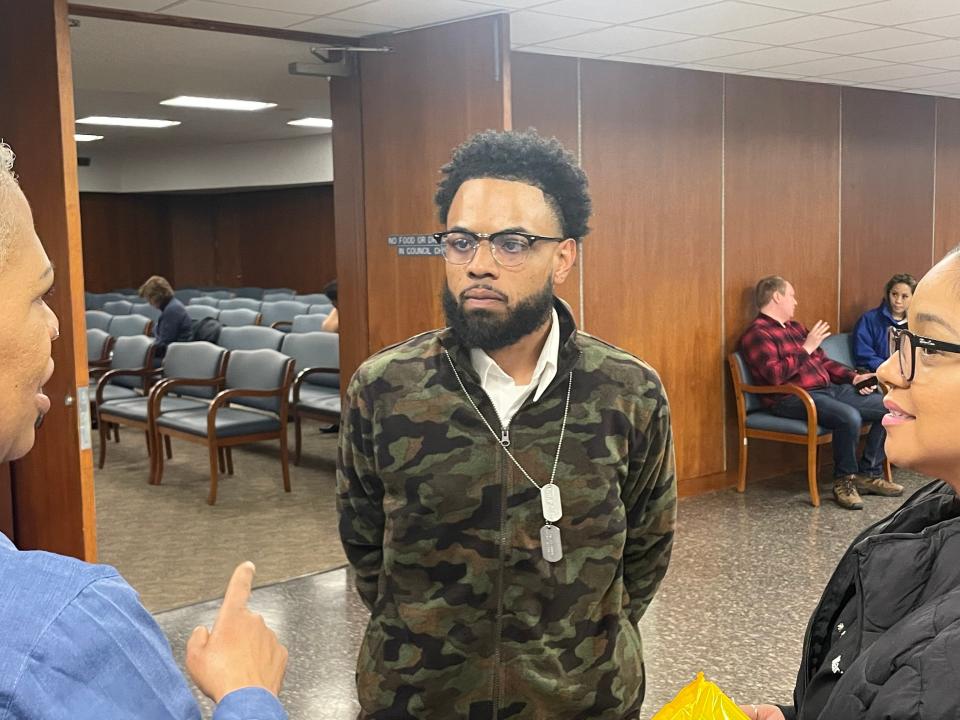Editorial: Will local Dems take opportunity to be fair, inclusive?
The local Democratic Party has a perfect opportunity to demonstrate a commitment to inclusion and fairness, to show an openness to youth and to change.
So far, Diana Hess, chairwoman for the St. Joseph County Democratic Party, hasn't taken that opportunity.
At Wednesday's Board of Election hearing, Hess made it clear she doesn't intend to override a rule for the sake of Bruce Mitchell, who filed to run for Common Council in the 6th District.
Mitchell needs Hess to step in since he doesn't meet a new statutory requirement to run on his party's ticket. The state law, which took effect last year, says a candidate's two most recent votes in Indiana primary elections must have been cast in primaries held by the party he or she seeks to represent.
Mitchell, an Iraq War veteran and self-described son of South Bend’s west side, explained in a Tribune op-ed that he'd always registered as a Democrat, but hadn’t voted in the last two primaries.
In fact, primary turnout in South Bend is abysmal. Fewer than 15,000 people voted in the 2019 municipal primary, a turnout of 15%. And the 6th District, where Mitchell would challenge incumbent Sheila Niezgodski, is one of two west side districts where most of the city's Black and Latino residents live — and where voters regularly turn out at lower rates in primary elections. In 2019, Democratic voters in the 6th District turned out at a rate of 14%.
Mitchell put it this way: "Our people, Black and brown people, don't know to get out in May, to vote for two primaries. We get out in November."
The new law's two-primaries rule can be overridden by a party's county chairperson, who can certify that a candidate is a member of the party he or she seeks to represent.

Critics at Wednesday's hearing view the provision allowing party leaders to override the rule as a controlling measure that keeps the party elite in power.
It's worth noting that the hearing itself was the result of an objection made against Mitchell's candidacy by 6th District precinct committee chairman and longtime Democrat Mike Kruk. Kruk said it's nothing personal against Mitchell, that he just noticed he failed to meet the new state law.
The issue was tabled at the hearing, which gives Hess and fellow Democratic leaders another week to decide whether they'll allow Mitchell on the ballot. But Hess told The Tribune she isn't likely to change her stance.
That's too bad. Because allowing Mitchell on the ballot would be the fair thing to do. It would be the party walking the walk of inclusiveness, in addition to talking the talk. To be clear, this particular case is about Mitchell, but it is the principle of fairness that we are defending, that we would similarly defend with other prospective candidates. We don't know Mitchell, and haven't heard his positions on the issues. But we believe that voters should make the determination about his candidacy, not a gatekeeper.
And gatekeeping is what Hess was doing when she told both Mitchell and another prospective candidate who failed to pass the two-primaries test that she wouldn't certify their party membership.
Hess said she supports the intent of the two-primaries law, because she wants more people to vote in primary elections. We can't fathom how a law that makes it easier to exclude a young candidate will somehow draw in young voters.
Hess denied that the party's adherence to the two-primaries rule is intended to limit inexperienced candidates from running against incumbents. Incumbent Niezgodski has served on the council since 2020. Her husband, David, is a state senator.
Hess said it's the party's goal to remain neutral during primary elections and to recruit more young, diverse candidates beforehand. But blocking a young, diverse candidate from running for office is hardly neutral.
As proof of the party's impartiality, Hess pointed to 3rd District candidate Drew Duncan. But Duncan, who is Black, meets the two-primaries requirement and therefore didn't need the party's assistance in his challenge to Common Council President Sharon McBride, who is also Black.
That's in contrast to the party's clear efforts to keep a young, Black man from challenging a white incumbent in the diverse 6th District. All while claiming, as Hess did, that "We do want more young people, and we do have a plan to try to make that happen."
If keeping prospective candidates off the ballot is part of that plan, it's time for local Democratic leaders to come up with a better one.
Editorials represent the opinion of the Tribune Editorial Board. Its members are Audience Engagement Editor Alesia I. Redding, Enterprise Editor Cory Havens and Executive Editor Ismail Turay Jr.
This article originally appeared on South Bend Tribune: St. Joe County Dems using state law to gatekeep, protect incumbents

